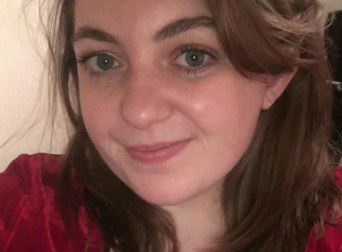Sign up for updates
Interested in studying at the University of Hertfordshire and want to sign up to our mailing list to learn more about our facilities, living in the UK and student life? Use the form below and our team will also keep you informed of key updates such as events near you, applications opening and more!
BA (Hons) English Literature with Film
Key information
-
Typical offer:
Entry requirements -
Fees: See below
Full details -
UCAS code: Q3W6
-
Institute code: H36
-
Study abroad option
-
Work placement option
Find out more
Why choose this course?
- English Literature has a 94.2% overall student positivity* score (National Student Survey, 2023)
- Specialise in the literature genre and period of your choice
- Close to the Warner Bros. and Harry Potter studios
We give you:
- The chance to explore the cross-over between these highly complementary disciplines.
- An expert academic team to support you and build your confidence as you develop into a scholar with expertise in both fields, plus the opportunity to get involved with local cinemas and our own bespoke film club.
- A global approach to both Literature and Film, providing both a broad overview of literary and cinematic history and the chance to study more specialised areas of interest.
- CV-building potential through work placements and extra-curricular activities.
What's the course about?
A degree in English Literature with Film will help you grow from passionate reader and film-fan into a critical thinker able to understand literary and cinematic works by applying a wide range of critical, theoretical, political and historical perspectives. The disciplines of Literature and Film Studies are highly complementary, and as you progress through your degree you will find many fruitful connections between them.
This fascinating degree is both geographically and historically wide-ranging. This means you’ll study literature written in English from the Renaissance to the present day, by writers from all parts of the globe; and alongside this, you’ll explore film and television from America, Asia, Britain and the rest of Europe, from the earliest days of moving images to some of the most exciting contemporary work being produced today.
In both disciplines, you’ll be taught by research-active academics who bring fresh thinking to our accessible, engaging courses. We’ll introduce you to writers and film-makers who will open doors to contemporary worlds and cultures remote from your own, and also help you explore more familiar works – both textual and visual – in ways that challenge your preconceptions.
Whatever your taste in literature, there will be something to interest and provoke you. From The Tiger Who Came to Tea to Jane Eyre, from Paradise Lost to Zadie Smith’s Swing Time, we’ll broaden your literary horizons and hone your critical thinking.
A core Literature module in your first year will equip you to read and interpret both traditional and contemporary literary texts critically as a scholar of English literature. Alongside this you can choose to revisit Shakespeare and consider his cultural relevance today through fictional, cinematic and TV adaptations; or to deepen your understanding of Gothic writing by tracing its origins back to the Romantic era.
In your second year you’ll focus on period-based literature from the Renaissance onwards and gain an understanding of literary history, from Elizabethan verse and drama, via Augustan poetry and the emergence of the novel in the 18 th century, to the radical transformations of the Victorian age, and the emergence of modernity in the twentieth century.
You’ll also have the opportunity to consider ways of reading that go beyond textual analysis or historical context, such as understanding literature through the political or ideological lens of Marxism, feminism and post-colonial theory. You can choose a work experience module, Literature at Work, which explores English in the classroom and aspects of the literary heritage industry. The module is centred around a six-week work placement where you’ll gain valuable transferable skills. Our students have worked as school classroom assistants, in publishing houses or attractions such as London’s Charles Dickens Museum and Dr Johnson’s House.
Work placement/study abroad option: Between your second and final year, you’ll have the option to study abroad or do a work placement for up to a year. Not only will this give you an amazing experience to talk about but will also give your CV a boost. If you’d rather go straight to your final year, that’s absolutely fine too.
You’ll have the chance to specialise in your final year, tailoring your literary study to reflect your own interests. Themed options include children’s literature, young adult fiction, Renaissance tragedy, European crime fiction, literary adaptations and the culture of print in the 18th century.
At the same time, your minor in Film will further hone your analytical skills, and give you a sophisticated appreciation of the craft of filmmaking. You’ll look at how the film and television industry has evolved and adapted to new technologies, how novels are recreated in film and how film gives us fresh perspectives on the world. You’ll also have opportunities to design and run film programmes, write and produce your own short films and hear guest lectures by film, television and media professionals. Topics covered range from silent movies to the Golden Age of Hollywood, the birth of the blockbuster, the influence of European style on American film, the way digital technology has transformed the industry, and why franchises have proved so successful, from James Bond and Star Wars to the Marvel cinematic universe.
Your main campus is College Lane
This is where the creative arts, science and health-related subjects are based. This means you’ll share the campus with future nurses, scientists, artists and more. You can use the common rooms to relax with friends, work out in the 24-hour gym or have a drink in our on-campus pub or cafes. We also have restaurants for you to eat in or grab something on the go. Our Learning Resources Centres are open 24/7, which means you can study whenever suits you best. Want to pop over to the other campus? You can take the free shuttle bus or walk there in just 15 minutes.
What will I study?
Students of English Literature with Film will be taught in a variety of ways according to the characteristics of each module. Many are taught via weekly lectures and weekly seminars, and there are timetabled weekly screenings to make sure that you always have the chance to see the films you are studying. Workshops are used in English Literature to discuss subjects in more depth and encourage independent analysis, and in Film for modules where the practical skills taught are enhanced by the supervision of experts in their field. You may be assessed using innovative methods such as the video-essay, for which you will be taught highly transferable skills in editing and presenting. You will also be expected to read and watch primary material in your own time, to contribute to online discussions, and to download and read notes from StudyNet, our virtual learning environment.
Check out our student blogs

Alumni Stories
April Wilson
Meet April Wilson, who used the diversity of her course to gain new experiences and learn. She is currently an Alumni Relations Coordinator at the University of Sussex.
Read more stories BA (Hons) English Literature with Film| Current job role | Alumni Relations Coordinator |
|---|---|
| Year of graduation | 2017 |
| Course of study | BA(Hons) English Literature with Film |
| MA Journalism with Media Communications |
University life and experience
April initially decided to go to the University of Hertfordshire due to our close proximity to London. She liked that it was easy to commute into the city for shopping and concerts, but that Hatfield wasn’t as expensive to live in!
While studying, April gained valuable experience which helped her develop essential skills for her current role which meant she was able to start ‘armed with the knowledge’ she needed.
However, the most useful thing she learnt from her postgraduate course was having confidence in herself and her ideas, especially when presenting. She credits this to ‘the support of my peers and lecturers who made me feel more confident in my abilities.'
She adds that her undergraduate degree helped her develop the writing and research skills which she applies daily to her current role and her approach to work.
Not only did April gain experience from her studies, but the extra-curricular activities she took part in also helped develop her skills. She says, ‘The writing and video editing experience I was able to gain from my time volunteering for societies at the University was also essential in helping me to have the skills that are valuable within my role.’
Future aspirations
April is also willing to try new experiences to help her gain valuable work experience in a variety of roles. She has previously, done everything from fundraising for charity to running my own online magazine.
In the future, April hopes to continues her studies and complete a PhD in Film Studies. She is particularly interested in looking at representation in films and how this is interpreted through social media.

